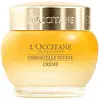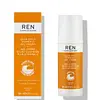What's inside
What's inside
 Key Ingredients
Key Ingredients

 Benefits
Benefits

 Concerns
Concerns

 Ingredients Side-by-side
Ingredients Side-by-side

Water
Skin ConditioningC12-15 Alkyl Benzoate
AntimicrobialCaprylic/Capric Triglyceride
MaskingGlycerin
HumectantOenothera Biennis Oil
EmollientDimethicone
EmollientCetearyl Alcohol
EmollientTapioca Starch
Ascorbyl Glucoside
AntioxidantGlyceryl Stearate
EmollientCamelina Sativa Seed Oil
Skin ConditioningHydroxyethyl Acrylate/Sodium Acryloyldimethyl Taurate Copolymer
Emulsion StabilisingCetyl Alcohol
EmollientHelichrysum Italicum Flower Oil
MaskingMyrtus Communis Oil
MaskingBorago Officinalis Seed Oil
EmollientHelichrysum Italicum Extract
AntiseborrhoeicEchium Plantagineum Seed Oil
Skin ConditioningMenyanthes Trifoliata Leaf Extract
Skin ConditioningBellis Perennis Flower Extract
Skin ConditioningHelianthus Annuus Seed Oil
EmollientRosmarinus Officinalis Leaf Extract
AntimicrobialMel
EmollientPolysorbate 60
EmulsifyingSodium Hyaluronate
HumectantSodium Citrate
BufferingPalmitic Acid
EmollientCetyl Palmitate
EmollientCetearyl Glucoside
EmulsifyingStearic Acid
CleansingGlyceryl Linoleate
EmollientSucrose Palmitate
EmollientSorbitan Isostearate
EmulsifyingCopper Gluconate
Skin ConditioningMagnesium Aspartate
Skin ConditioningPEG-100 Stearate
Disodium EDTA
Ethylhexylglycerin
Skin ConditioningPhenoxyethanol
PreservativeChlorphenesin
AntimicrobialPotassium Sorbate
PreservativeSodium Benzoate
MaskingTocopheryl Acetate
AntioxidantZinc Gluconate
Skin ConditioningTocopherol
AntioxidantParfum
MaskingLinalool
PerfumingBenzyl Salicylate
PerfumingLimonene
PerfumingGeraniol
PerfumingCitral
PerfumingWater, C12-15 Alkyl Benzoate, Caprylic/Capric Triglyceride, Glycerin, Oenothera Biennis Oil, Dimethicone, Cetearyl Alcohol, Tapioca Starch, Ascorbyl Glucoside, Glyceryl Stearate, Camelina Sativa Seed Oil, Hydroxyethyl Acrylate/Sodium Acryloyldimethyl Taurate Copolymer, Cetyl Alcohol, Helichrysum Italicum Flower Oil, Myrtus Communis Oil, Borago Officinalis Seed Oil, Helichrysum Italicum Extract, Echium Plantagineum Seed Oil, Menyanthes Trifoliata Leaf Extract, Bellis Perennis Flower Extract, Helianthus Annuus Seed Oil, Rosmarinus Officinalis Leaf Extract, Mel, Polysorbate 60, Sodium Hyaluronate, Sodium Citrate, Palmitic Acid, Cetyl Palmitate, Cetearyl Glucoside, Stearic Acid, Glyceryl Linoleate, Sucrose Palmitate, Sorbitan Isostearate, Copper Gluconate, Magnesium Aspartate, PEG-100 Stearate, Disodium EDTA, Ethylhexylglycerin, Phenoxyethanol, Chlorphenesin, Potassium Sorbate, Sodium Benzoate, Tocopheryl Acetate, Zinc Gluconate, Tocopherol, Parfum, Linalool, Benzyl Salicylate, Limonene, Geraniol, Citral
Water
Skin ConditioningGlycerin
HumectantCetearyl Ethylhexanoate
EmollientLauryl Laurate
Skin ConditioningCetearyl Alcohol
EmollientTapioca Starch
Ascorbyl Glucoside
AntioxidantHydroxyacetophenone
AntioxidantCarbomer
Emulsion StabilisingPhenoxyethanol
PreservativeCetearyl Glucoside
EmulsifyingMannitol
HumectantFaex Extract
Skin ConditioningCitrus Grandis Peel Oil
MaskingHippophae Rhamnoides Oil
EmollientParfum
MaskingCitrus Aurantium Dulcis Flower Oil
AstringentTocopherol
AntioxidantCitrus Nobilis Peel Oil
MaskingCitrus Tangerina Peel Oil
MaskingDiglucosyl Gallic Acid
Glycogen
HumectantMagnesium Ascorbyl Phosphate
AntioxidantAmmonium Bicarbonate
BufferingGlucose
HumectantHelianthus Annuus Seed Oil
EmollientRosmarinus Officinalis Leaf Extract
AntimicrobialSodium Hydroxide
BufferingCitral
PerfumingLimonene
PerfumingLinalool
PerfumingWater, Glycerin, Cetearyl Ethylhexanoate, Lauryl Laurate, Cetearyl Alcohol, Tapioca Starch, Ascorbyl Glucoside, Hydroxyacetophenone, Carbomer, Phenoxyethanol, Cetearyl Glucoside, Mannitol, Faex Extract, Citrus Grandis Peel Oil, Hippophae Rhamnoides Oil, Parfum, Citrus Aurantium Dulcis Flower Oil, Tocopherol, Citrus Nobilis Peel Oil, Citrus Tangerina Peel Oil, Diglucosyl Gallic Acid, Glycogen, Magnesium Ascorbyl Phosphate, Ammonium Bicarbonate, Glucose, Helianthus Annuus Seed Oil, Rosmarinus Officinalis Leaf Extract, Sodium Hydroxide, Citral, Limonene, Linalool
 Reviews
Reviews

Ingredients Explained
These ingredients are found in both products.
Ingredients higher up in an ingredient list are typically present in a larger amount.
Ascorbyl Glucoside is a stable form of Vitamin C. It is created by combining glucose from starch.
When applied to skin, Ascorbyl Glucoside turns into Ascorbic Acid.
Ascorbyl Glucoside is an antioxidant. Antioxidants help fight free-radicals, or molecules that may damage skin cells.
It can help to reduce redness, improve skin texture, reduce the effects of aging, reduce the visibility of dark spots, and brighten skin.
Read more about other types of Vitamin C:
Learn more about Ascorbyl GlucosideCetearyl alcohol is a mixture of two fatty alcohols: cetyl alcohol and stearyl alcohol. It is mainly used as an emulsifier. Emulsifiers help prevent the separation of oils and products. Due to its composition, it can also be used to thicken a product or help create foam.
Cetearyl alcohol is an emollient. Emollients help soothe and hydrate the skin by trapping moisture.
Studies show Cetearyl alcohol is non-toxic and non-irritating. The FDA allows products labeled "alcohol-free" to have fatty alcohols.
This ingredient is usually derived from plant oils such as palm, vegetable, or coconut oils. There is debate on whether this ingredient will cause acne.
Due to the fatty acid base, this ingredient may not be Malassezia folliculitis safe.
Learn more about Cetearyl AlcoholCetearyl Glucoside is a surfactant and emulsifier. It can be produced from synthetic of natural sources of cetearyl alcohol and glucose.
Emulsifiers help prevent ingredients from separating, such as oils and waters. It can also be used to enhance the texture of products.
As a surfactant, Cetearyl Glucoside helps during the cleansing process. By gathering all the dirt and oils, it allows these molecules to be washed away easily.
Learn more about Cetearyl GlucosideCitral is a fragrance and used to add a lemon-like scent to products. It is both naturally found in plants and created synthetically. In plants, it is commonly occurring in lemon myrtle, lemongrass, lemon tea-tree, lemon verbena, and other citruses.
The EU mandates Citral be listed separately as a fragrance. It is a known allergen and may cause contact dermatitis. Citral can also used as a masking ingredient.
The term 'fragrance' is not regulated in many countries. In many cases, it is up to the brand to define this term. For instance, many brands choose to label themselves as "fragrance-free" because they are not using synthetic fragrances. However, their products may still contain ingredients such as essential oils that are considered a fragrance.
The term 'citral' is a collective term for two geometric isomers: geranial/Citral A and neral/Citral B.
Learn more about CitralGlycerin is already naturally found in your skin. It helps moisturize and protect your skin.
A study from 2016 found glycerin to be more effective as a humectant than AHAs and hyaluronic acid.
As a humectant, it helps the skin stay hydrated by pulling moisture to your skin. The low molecular weight of glycerin allows it to pull moisture into the deeper layers of your skin.
Hydrated skin improves your skin barrier; Your skin barrier helps protect against irritants and bacteria.
Glycerin has also been found to have antimicrobial and antiviral properties. Due to these properties, glycerin is often used in wound and burn treatments.
In cosmetics, glycerin is usually derived from plants such as soybean or palm. However, it can also be sourced from animals, such as tallow or animal fat.
This ingredient is organic, colorless, odorless, and non-toxic.
Glycerin is the name for this ingredient in American English. British English uses Glycerol/Glycerine.
Learn more about GlycerinHelianthus Annuus Seed Oil is the oil derived from the seeds of a Sunflower. Sunflower seed oil is non-fragrant. It is an emollient, meaning it helps to soften the skin.
Sunflower seed oil contains many fatty acids. The fatty acids found in sunflower seeds include (from highest amount to least): linoleic acid, myristic acid, palmitic acid, stearic acid, arachidic acid, oleic acid, and linolenic acid.
These fatty acids help the skin create ceramides. Ceramides play a role in repairing the skin barrier.
Helianthus Annuus Seed Oil helps moisturize the skin. This in turn helps the skin look more rejuvenated and smoother.
Sunflowers are rich in vitamin E.
Historians believe Indigenous cultures of North America domesticated sunflowers before corn. Thus they relied on sunflower oil for a variety of uses. One such use is moisturizing skin and hair.
Sunflower seed oil may not be fungal acne safe. We recommend speaking with a professional if you have any concerns.
Learn more about Helianthus Annuus Seed OilLimonene is a fragrance that adds scent and taste to a formulation.
It's found in the peel oil of citrus fruits and other plants such as lavender and eucalyptus. The scent of limonene is generally described as "sweet citrus".
Limonene acts as an antioxidant, meaning it helps neutralize free radicals.
When exposed to air, oxidized limonene may sensitize the skin. Because of this, limonene is often avoided by people with sensitive skin.
The term 'fragrance' is not regulated in many countries. In many cases, it is up to the brand to define this term. For instance, many brands choose to label themselves as "fragrance-free" because they are not using synthetic fragrances. However, their products may still contain ingredients such as essential oils that are considered a fragrance.
Learn more about LimoneneLinalool is a fragrance and helps add scent to products. It's derived from common plants such as cinnamon, mint, citrus, and lavender.
Like Limonene, this ingredient oxidizes when exposed to air. Oxidized linalool can cause allergies and skin sensitivity.
This ingredient has a scent that is floral, spicy tropical, and citrus-like.
Learn more about LinaloolParfum is a catch-all term for an ingredient or more that is used to give a scent to products.
Also called "fragrance", this ingredient can be a blend of hundreds of chemicals or plant oils. This means every product with "fragrance" or "parfum" in the ingredients list is a different mixture.
For instance, Habanolide is a proprietary trade name for a specific aroma chemical. When used as a fragrance ingredient in cosmetics, most aroma chemicals fall under the broad labeling category of “FRAGRANCE” or “PARFUM” according to EU and US regulations.
The term 'parfum' or 'fragrance' is not regulated in many countries. In many cases, it is up to the brand to define this term.
For instance, many brands choose to label themselves as "fragrance-free" because they are not using synthetic fragrances. However, their products may still contain ingredients such as essential oils that are considered a fragrance by INCI standards.
One example is Calendula flower extract. Calendula is an essential oil that still imparts a scent or 'fragrance'.
Depending on the blend, the ingredients in the mixture can cause allergies and sensitivities on the skin. Some ingredients that are known EU allergens include linalool and citronellol.
Parfum can also be used to mask or cover an unpleasant scent.
The bottom line is: not all fragrances/parfum/ingredients are created equally. If you are worried about fragrances, we recommend taking a closer look at an ingredient. And of course, we always recommend speaking with a professional.
Learn more about ParfumPhenoxyethanol is a preservative that has germicide, antimicrobial, and aromatic properties. Studies show that phenoxyethanol can prevent microbial growth. By itself, it has a scent that is similar to that of a rose.
It's often used in formulations along with Caprylyl Glycol to preserve the shelf life of products.
Rosmarinus Officinalis Leaf Extract comes from rosemary. Rosemary is native to the Mediterranean.
While Rosmarinus Officinalis Leaf Oil can be volatile due to its fragrant properties, the fragrance components are usually removed in the leaf extract.
Rosemary Leaf Extract contains many antioxidants such as rosmarinic acid and caffeic acid. Rosemarinic acid, a compound found in rosemary leaf, has been found to help soothe skin conditions such as eczema and acne.
Learn more about Rosmarinus Officinalis Leaf ExtractTapioca starch is a thickening agent and is made from the cassava root, also known as yucca.
According to a manufacturer, it is an excellent talc replacement.
It is gluten-free.
Learn more about Tapioca StarchTocopherol (also known as Vitamin E) is a common antioxidant used to help protect the skin from free-radicals and strengthen the skin barrier. It's also fat soluble - this means our skin is great at absorbing it.
Vitamin E also helps keep your natural skin lipids healthy. Your lipid skin barrier naturally consists of lipids, ceramides, and fatty acids. Vitamin E offers extra protection for your skin’s lipid barrier, keeping your skin healthy and nourished.
Another benefit is a bit of UV protection. Vitamin E helps reduce the damage caused by UVB rays. (It should not replace your sunscreen). Combining it with Vitamin C can decrease sunburned cells and hyperpigmentation after UV exposure.
You might have noticed Vitamin E + C often paired together. This is because it is great at stabilizing Vitamin C. Using the two together helps increase the effectiveness of both ingredients.
There are often claims that Vitamin E can reduce/prevent scarring, but these claims haven't been confirmed by scientific research.
Learn more about TocopherolWater. It's the most common cosmetic ingredient of all. You'll usually see it at the top of ingredient lists, meaning that it makes up the largest part of the product.
So why is it so popular? Water most often acts as a solvent - this means that it helps dissolve other ingredients into the formulation.
You'll also recognize water as that liquid we all need to stay alive. If you see this, drink a glass of water. Stay hydrated!
Learn more about Water